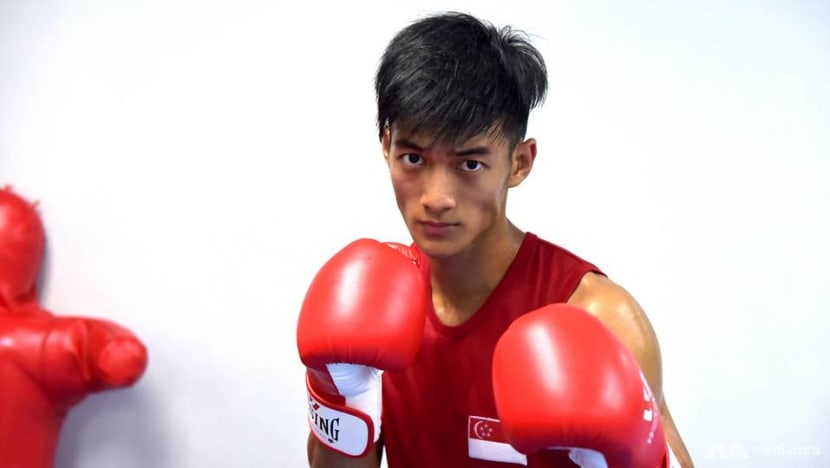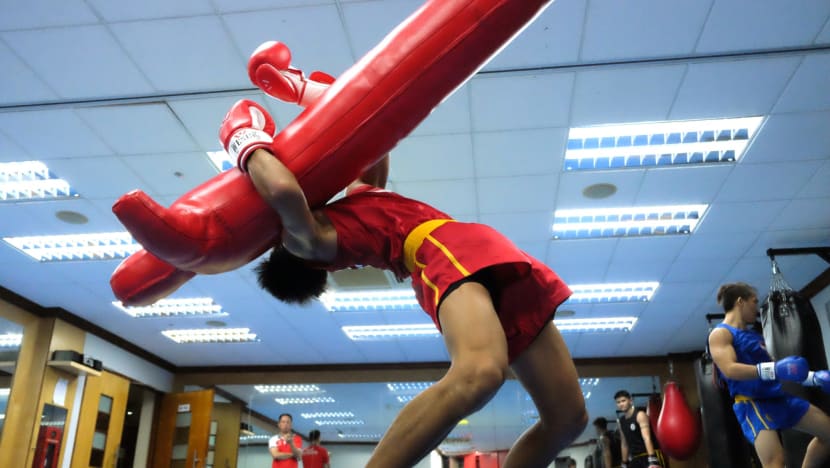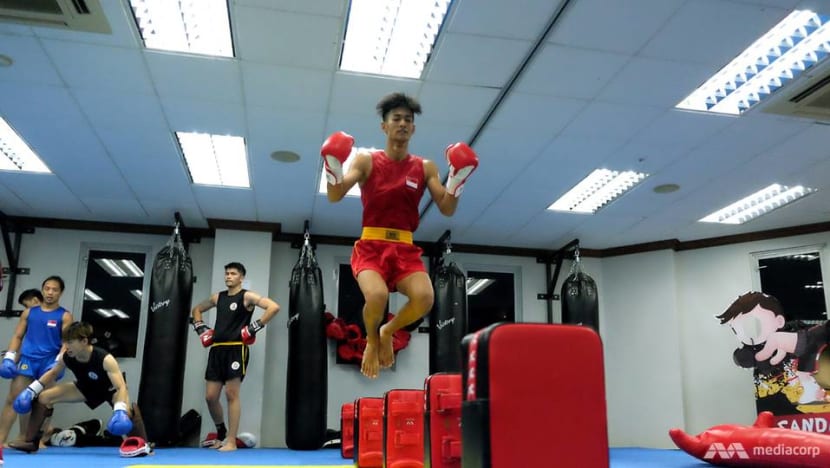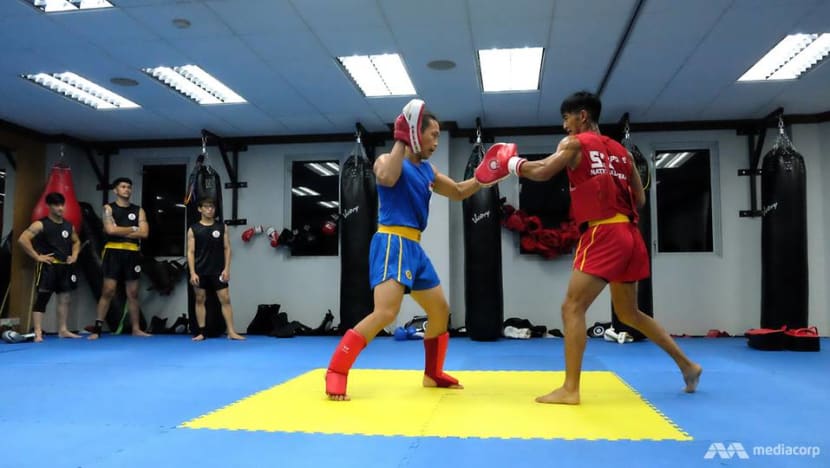His mum wants him to punch others: The Sanda fighter channeling his family's support at the Asian Games

Jason Goh will be the first-ever Singaporean to represent the nation in Sanda at the Asian Games. (Photo: Matthew Mohan)
SINGAPORE: Jason Goh vividly remembers the one and only time his father watched him fight "live".
"I won that one," the 23-year-old said softly, with pride in his voice. "I fought and kicked until the opponent wasn’t able to stand," he continued, with his arms miming some quick shadowboxing.
Due to work commitments, Goh's parents - his father works in sales while his mother is a dim sum chef - are usually unable to attend his matches.
But this is not to say they have missed out on his development. Goh makes a meticulous effort to video all his bouts, so that his parents, along with his three brothers, can catch him in action, even when they cannot attend.
"Mentally, I feel stronger knowing they are behind me, even when they are not physically in the stands," he told Channel NewsAsia. "They like to watch me, especially my youngest brother. He's my biggest fan."
In a few weeks' time, Goh's family will be able to watch him make history as the first Singaporean to compete in the sport of Sanda at the upcoming Asian Games in Indonesia.
A combat sport developed from traditional wushu techniques, Sanda involves the use of punching, kicking and throwing techniques, among others.
Athletes don protective headgear, mouth guards, gloves and chest protectors before fighting in furious, fast-paced bouts comprising of three two-minute rounds.
There is a one-minute break between rounds. Judges award points based on several criteria, and the competitor who wins two rounds becomes the overall winner.
Sanda, which comes under the broad umbrella of wushu, flies under the radar in Singapore when compared with other mainstream fight sports such as Mixed Martial Arts (MMA) or Muay Thai.

There are about 1,000 Sanda exponents in Singapore, according to national coach Ng Boon Hock.
"Most of them practice in polytechnics, others in community clubs or gyms," said Ng. "But their standards have to be raised much higher to reach the national team level - we have six in that squad."
“When I tell others that I do Sanda, they will say is that MMA? Or Muay Thai? I usually tell them that its contact wushu,” Goh added.
EVERYBODY WAS KUNGFU FIGHTING
Weaned on old Bruce Lee films when he was in primary school, Goh grew up admiring the legendary kungfu fighter.
“It was very shiok to watch it, there was that adrenaline rush,” said Goh "I really liked his speed - the punches and kicks were very flexible and very fast. I would ask my father what sort of kungfu this was, and things like that. He told me it was Wing Chun but there is an actual combat component of wushu - Sanda. That sparked my interest."
Goh's father participated in the sport of Sanda during his younger days, but did not compete due to a heart problem.
His son would take more than ten years to follow in his footsteps.
"There were not many Sanda clubs in Singapore back then - only one or two," said Goh. “I have three brothers who were all studying and so I felt that maybe we couldn’t afford it (if I went to train in a club). I wanted to wait till I started to earn money -that was in National Service (NS)."

Goh took up kickboxing while serving his NS before switching disciplines when his coach invited him to participate in a Sanda tournament.
“The explosiveness and the speed of Sanda drew me to the sport. You have to go into moves quickly with a lot of force," said Goh. “It’s actually similar to a chess game. You have a very short time to analyse your opponents. When I hit, I have to always anticipate the next move. You need to know when your opponent makes a move towards you, and how you are going to react next.”
While others might dread training sessions, Goh relishes them - even if they takes an additional toll on top of his full-time occupation as a fitness trainer with Certis Cisco.
He trains six times a week, on top of conducting physical training for staff as part of his day job.
“It’s a bit tiring but manageable, If I don’t train, I will feel I have like nothing to do and no outlet (to release my energy).”
SANDA FOR SINGAPORE
Given the physicality of the sport, Sanda is not without its risks.
Goh has suffered a shoulder separation in the past, and grapples with nerve issues on his other arm - which once resulted in him being unable to lift his hand when preparing for the World Wushu Championships in Kazan, Russia last year.

These troubles are now behind him, he is quick to add, but Goh still could face the music back at home.
“My mum doesn’t like me to get hit. There was one time I came home from a competition with a black eye, then she looked at me and said that I was very lousy,” he added with a laugh. "She wants me to punch others, and I'd better not get punched."
There is a quiet confidence about Goh, despite only picking up Sanda in 2015.
"He is a reserved guy," explained Ng. "Jason often keeps to himself, but when he is up against an opponent you can really see his endurance and fighting spirit."
Goh finished fifth in Kazan after being knocked out in the quarter-finals. The result was enough for him to meet the qualification mark set for the Asian Games, becoming the first Singaporean to feature in the event since Sanda was introduced to the tournament twenty years ago.
But making history doesn’t seem to stress Goh out either – the thought of being Singapore’s first ever Sanda athlete at the Asian Games did not even cross his mind, till it was raised prior to his interview with Channel NewsAsia.
“My goal is to do my best. I feel like every fight is a final and I plan to learn from every fight,” said Goh, who will be competing in the men’s 56kg category.
“There’s no need to stress, I trained hard and I know I’ll be okay.”















